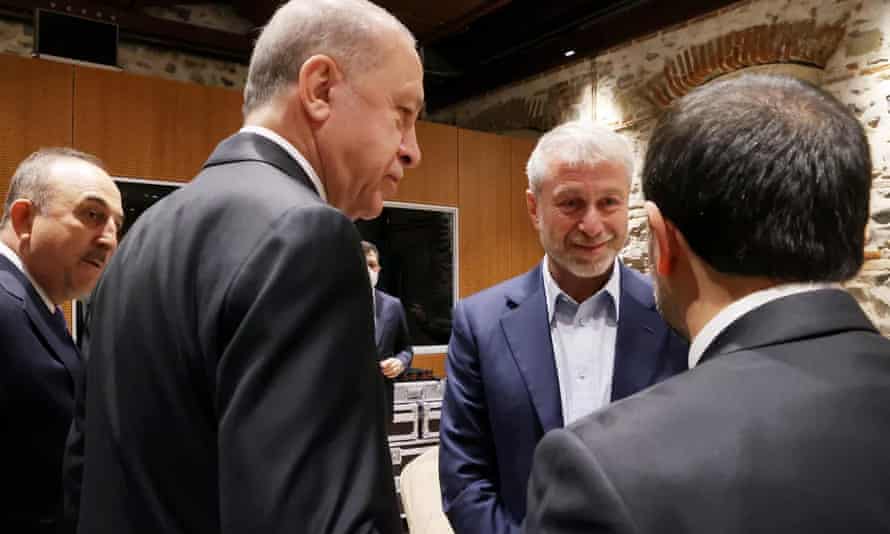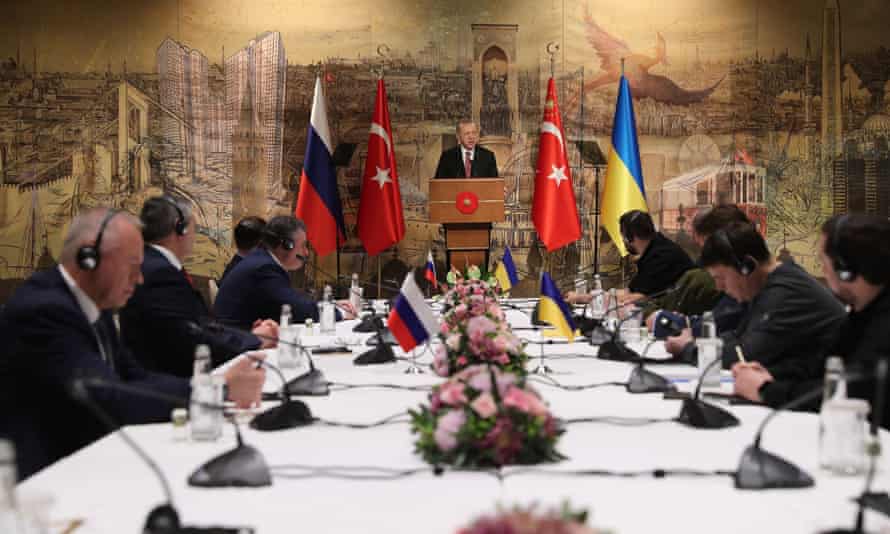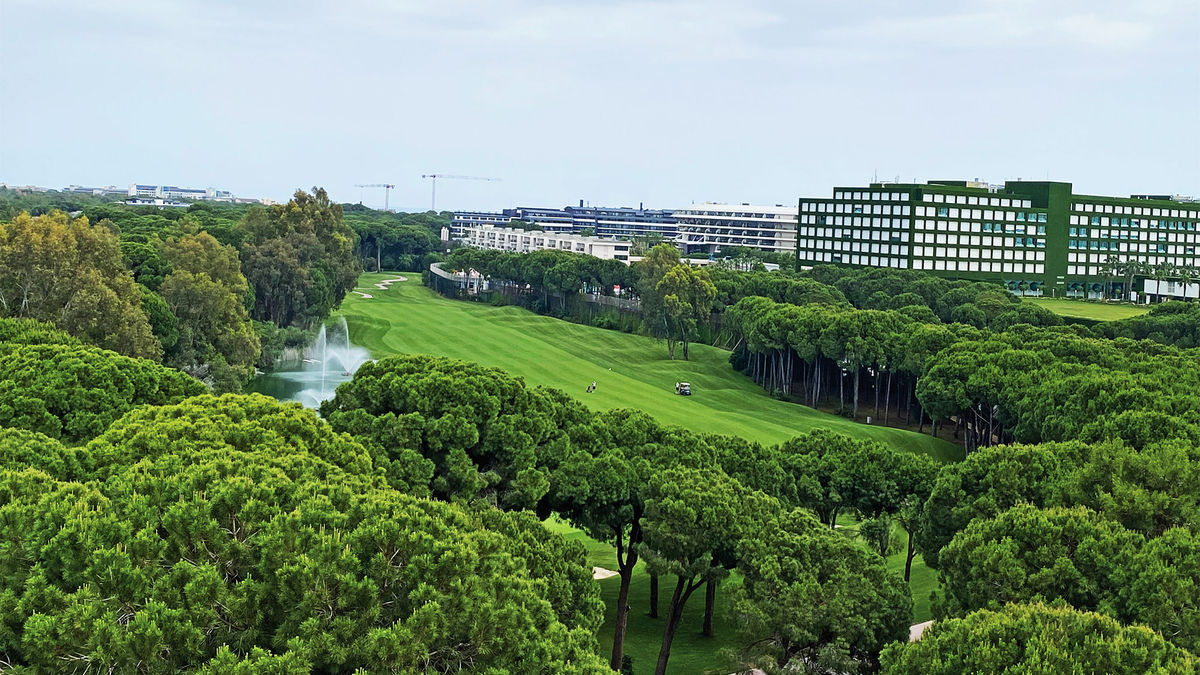Ukraine-Russia peace talks start in Turkey amid warnings they may again fail
Fresh talks between Ukraine and Russia have begun in Istanbul, with Kyiv seeking a ceasefire without compromising on its sovereignty or territorial integrity and both sides playing down hopes of an early breakthrough.
Turkey’s president, Recep Tayyip Erdoğan, opened the talks on Tuesday – the two delegations’ first face-to-face meeting in more than a fortnight – at the Dolmabahçe Palace in Istanbul, urging both sets of negotiators to “put an end to this tragedy”.
With Russia’s invasion appearing stalled on the ground, Erdoğan said each side had “legitimate concerns” but added: “We have now entered a period where concrete results are needed.” It should be “possible to reach a solution acceptable to the international community”, he said, with further conflict “in no one’s interest”.
Ukrainian media said the talks – with the Russian oligarch Roman Abramovich in attendance – started with “a cold welcome and no handshake”. Mykhailo Podolyak, a political adviser to the Ukrainian president, Volodymr Zelenskiy, said delegations were working on “the entire spectrum of contentious issues”.

Ukraine’s foreign minister, Dmytro Kuleba, said the least he was hoping for was an end to the country’s humanitarian catastrophe, and the most was a ceasefire. “We are not trading people, land or sovereignty,” he insisted.
“If we see that the mood has changed and they are ready for a serious, substantive conversation and balanced arrangements, then things will move forward,” Kuleba said. He said if it was a “repetition of their propaganda”, then talks would again fail.
A senior US state department official said Russia’s leader, Vladimir Putin, did not seem ready to make any compromises to end the war, and Vadym Denysenko, an adviser to the Ukrainian interior minister, said that he doubted there would be a breakthrough.
Moscow’s invasion of Ukraine on 24 February has killed an estimated 20,000 people, forced more than 10 million from their homes – including more than 3.8 million who have fled the country – and triggered an unprecedented range of western economic sanctions on Russia.
Kyiv has suggested Moscow may be more flexible after failing in its initial aim of encircling the Ukrainian capital and forcing the government’s capitulation, as its forces were held up by logistical failings, heavy losses and stiff Ukrainian resistance.
“We have destroyed the myth of the invincible Russian army,” the mayor of Kyiv, Vitali Klitschko, said. “We are resisting against the aggression of one of the strongest armies in the world and have succeeded in making them change their goals.”
Ukrainian intelligence said on Tuesday thatPutin was seeking to compensate for his “weakened, disoriented” forces by trying to destroy cities through “indiscriminate artillery fire and rocket-bomb attacks”.
Moscow said last week it was shifting its focus to expanding the territory held by pro-Russian separatists in the contested Donbas region, where Zelenskiy has previously hinted some compromise might be possible.

Zelenskiy has also warned repeatedly, however, that while Ukraine might be prepared to accept some kind of neutral status with international guarantees, the country’s “sovereignty and territorial integrity” remain its top priority in any talks.
Putin has demanded the “demilitarisation and denazification” of Ukraine, as well as the imposition of neutral status and recognition of the Donbas and Crimea, which Moscow seized in 2014, as no longer part of Ukrainian territory.
Ukrainian forces retook Irpin, north-west of Kyiv, from Russian troops, who were regrouping to take the area back, Zelenskiy said late on Monday. “We still have to fight, we have to endure,” he said. “We can’t raise expectations.”
A senior US defence official said Ukrainian troops had also retaken Trostyanets, south of Sumy, in the east, adding that Russia’s forces remained largely in defensive positions near Kyiv and were making little forward progress elsewhere in the country.
Humanitarian conditions remain catastrophic in several southern and eastern cities, however, including the besieged and heavily bombarded southern port city of Mariupol, where the mayor’s office has said nearly 5,000 people have been killed, including about 210 children.
Ukraine’s deputy prime minister Iryna Vereshchuk said she hoped three humanitarian corridors would be opened on Tuesday to evacuate civilians from besieged towns and cities, including Mariupol.
Earlier peace talks, both by video and in person, failed to make progress towards a ceasefire. The latest round takes place against the background of allegations that delegates to previous informal talks in Kyiv in early March were poisoned.
Abramovich and a Ukrainian MP and peace negotiator, Rustem Umerov, suffered symptoms consistent with poisoning earlier this month, according to a source with direct knowledge of the incident.
Both men, who consumed only chocolate and water, were treated for symptoms that reportedly included loss of sight and peeling skin. The allegations were first reported in the Wall Street Journal and by the investigative outlet Bellingcat.


